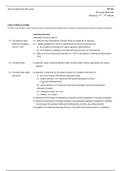Summary
Summary CIE AS Chemistry Note Unit 4 - States of matter
- Course
- Institution
These notes cover the whole syllabus of 9701 Cambridge International Examination, AS Level Chemistry Notes what divided into to different Units. You may find each notes have corresponded specifically in each term from syllabus. CIE AS Chemistry Note Unit 4 - States of matter
[Show more]



